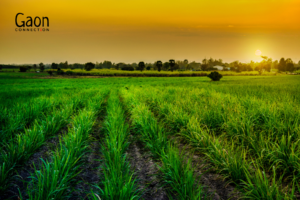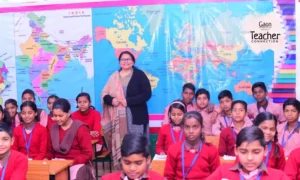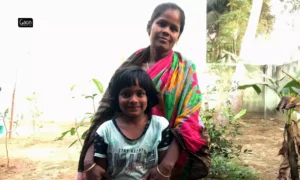Udki (Panna), Madhya Pradesh
It is a happily-ever-after-story that has unfolded at Udki, a small village located about 22 kilometres away from Panna, Madhya Pradesh. The saga has been scripted by Govind Mandal, a farmer now, but who was a cycle rickshaw driver for almost 20 years.
As he stood scattering grains for the squawking hens near a pond, the 50-year-old farmer told Gaon Connection, “I did not want to be a rickshaw driver forever, so I decided to grow fruit trees. At least then I will be remembered as the man who planted fruit trees,” he laughed.
But now, he is much more than the ‘fruit trees man’. Mandal has earned fame as a successful organic farmer, who, despite being unlettered, is guiding other farmers in the region to take up integrated farming and earn profits.
Also Read: An integrated farming model promises monthly earning of Rs 25,000 from an acre of land
A humble beginning with a farm pond
Mandal’s village Udki has no more than seven hundred inhabitants, most of them Bengalis. The families were rehabilitated here in 1970 when they came away to India from the newly formed Bangladesh, and given patta lands. Mandal has five acres of land near his village, falling under Ahirguwan panchayat.
Till 2014-15, Mandal, a father of four, used to drive a rickshaw to feed his family earning no more than Rs 250 a day. Then, he approached the district MGNREGA (Mahatma Gandhi National Rural Employment Guarantee Act) office to help build a pond on his agriculture land. And ever since, there has been no looking back.
“Mandal approached us with a request to help him create a pond on his land so that he could breed fishes there,” Sanjay Singh Parihar, district project officer, (MGNREGA) Panna, told Gaon Connection. Once he had that there was no stopping him, he said.
The pond built with the help of MGNREGA is now a source of nearly a lakh of rupees a year, project officer Parihar pointed out.
“I have fish in my pond, some of them weighing upto seven kilos each,” Mandal said happily. Being from Bengal, the fish is an integral part of their diet. Besides, it earns him and his family an extra income. “There are rohu and katla fish in my pond. I got the spaw from the fisheries department,” said the proud farmer.
Organic farm
With the farm pond ready, Mandal now had enough water to irrigate his land too and he began farming in earnest, using an integrated model. He began to grow several vegetables, wheat and paddy,besides fruits, ensuring that he had a steady income throughout the year.
And, if for any reason one of Mandal’s crops failed, there was always another to fall back on.
Mandal’s model farm is organic and uses no chemicals. “I only use cow dung from my cattle as I know using chemicals is harmful to health. Why would I knowingly ruin my health and that of others,” he asked.
Also Read: Thai guavas help a farmer in Dhar, Madhya Pradesh script his success story
Walking around in his farm, Mandal pointed out trees laden with mangoes, guavas, jackfruit, sweet lime, etc. “This is the sabri banana, famous in Kolkata. When it ripens, its fragrance spreads across my farm,” he said happily.
Mandal has two daughters who are married and two sons. His older son, 26-year-old Niranjan and his 21-year-old son Chotu work alongside him on his farm.
This year, the Mandals planted paddy in four acres of their land and got about 125 quintals. They will cultivate wheat next after the paddy has been harvested, Mandal’s son Niranjan said, from which they manage to get 70-80 quintals of wheat. The vegetables and fruits from Mandal’s farm sell fast at the local village market.
According to Niranjan, they manage to earn about two to three lakh rupees a year from paddy and wheat alone. The vegetables, fish and eggs from their hens add to their income. From the fish they get about a lakh of rupees yearly, he said. They also have about 100 free range hens that fetch a good price. “Our income went up once MGNREGA helped build our pond in 2016-17,” Niranjan told Gaon Connection.
“We are not in want of anything. Whatever we need we grow and we are living well and happily,” Mandal declared. “The best thing is we are self reliant,” he smiled.
Spreading the word far and wide
So impressive were the results of Mandal’s hard work that K Balguru, the zilla panchayat CEO, visited his farm and assured him of all support.
“Farmers from far and near, hearing about the bounty of Mandal’s farm come to him for advice,” Gyanendra Tiwari, regional coordinator of a volunteer organisation support group, told Gaon Connection.
“Mandal’s son Nirajan also works hard with his father and they have made such a success of their integrated farming venture that they do not have to go anywhere looking for welfare schemes that will help them. People in charge of the schemes themselves step forward and offer support,” Tiwari said.
It does not matter at all that Mandal is not literate. He has created a shining model farm and farmers now come to him for advice, Tiwari pointed out.
In a function organised at Sihaur district in the state, October 20, to felicitate farmers who practised organic cultivation, Kamal Patel, agriculture minister, Madhya Pradesh, said that the state was leading in organic farming.
According to the minister, over one million hectares of land was under organic cultivation in the state. He also said that with the green revolution in order to step up production, traditional methods of agriculture had been neglected. The excessive use of pesticides and chemical fertilisers in order to increase yield has poisoned the soil, the minister added.
“But, efforts were being made to change that in the state with the emphasis being on organic cultivation for which all support will be extended to the farmers,” said the state agriculture minister.
Also Read: Using indigenous seeds to sustain livelihoods, fight climate change and pay off loans



















